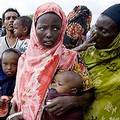 一份由聯合國人口基金會(UNFPA)發表的最新「2009世界人口現況」報告指出,對於各國及全球對抗氣候變遷的努力而言,女性的角色至關重要。
一份由聯合國人口基金會(UNFPA)發表的最新「2009世界人口現況」報告指出,對於各國及全球對抗氣候變遷的努力而言,女性的角色至關重要。
這份報告指出,氣候變遷不僅是有關能源效率或是工業碳排放,更是個關於人口動態、貧困和性別平等的議題。該報告預言,假若氣候政策、方案和條約能夠考慮到女性的需要、權利和潛力;那麼人類在對抗氣候變遷的戰役中較可能成功。
人口基金執行主任奧貝德指出,「貧窮國家的貧困婦女是受氣候變遷影響最深的,然而他們是排放最少溫室氣體的一群人。」 她也提到,「這份報告顯示出婦女有能力動員以面對氣候變遷,但只有透過相關賦權政策,才能實現她們這種潛能。報告也提出,可使婦女充分促進氣候調適、減緩和建設恢復能力的必要支持措施。
報告指出,其中一個關鍵的措施是「將性別議題納入全球減緩和適應氣候變遷的努力」。
本研究試圖將關於氣候變遷的辯論,從抽象和技術科學面向,轉移至個人及世界人口與氣候變遷相互影響的現實面上。
窮人特別容易受到氣候變遷影響;且每天靠低於一美元維生的1.5億人中,大多數是女性。報告指出,窮人較可能以農為生,因此當旱災、無法預測的降雨及空前強勁的颶風襲擊時,容易遭受饑荒或失去生計的風險。
窮人大多生活在邊緣地區,易受洪水、海平面上升和暴風雨之苦。考慮到這一點,報告呼籲各國政府應提前計劃,以強化降低風險、防災、災害管理與安置可能因此流離失所的人。
研究中提到,女性比男性更容易死於包括極端氣候的自然災害,這種男女之間的差距最明顯的在於低收入族群。
另一個應對氣候變遷的關鍵支持措施,即投資於女性的教育和健康。這項研究的結論是,這類投資賦予婦女和女童權力,加強其經濟發展與減少貧困,也對氣候有益。
受到較佳教育的成年後通常有人口較少、較健康的家庭。該報告認為,獲得包括家庭計畫在內的生育保健服務的婦女,可降低生育率;這點從長遠來看有助於緩和溫室氣體排放增長。
放眼12月哥本哈根的聯合國氣候變化會議,奧貝德呼籲,婦女的角色應包括在該會議預計將產出的後京都協議。
Women are central to global and national efforts to cope with climate change, concludes a new report, "The State of World Population 2009," released today by the United Nations Population Fund, UNFPA.
Climate change is more than an issue of energy efficiency or industrial carbon emissions; it is also an issue of population dynamics, poverty and gender equity, the report points out. The authors predict that the fight against climate change is more likely to be successful if policies, programs and treaties take into account the needs, rights and potentials of women.
"Poor women in poor countries are among the hardest hit by climate change, even though they contributed the least to it," says UNFPA Executive Director Thoraya Ahmed Obaid.
"This report shows that women have the power to mobilize against climate change, but this potential can be realized only through policies that empower them. It also shows the required support that would allow women to fully contribute to adaptation, mitigation and building resilience to climate change," Obaid says.
A key aspect of that support is to "integrate gender considerations into global efforts to mitigate and adapt to climate change," the report states.
This study attempts to shift the debate on climate change from abstractions and technical science to the realities of the ways that individuals and the world's population influence and are affected by climate change.
The poor are especially vulnerable to the effects of climate change, and the majority of the 1.5 billion people living on $1 a day or less are women. The report points out that the poor are more likely to depend on agriculture for a living and therefore risk going hungry or losing their livelihoods when droughts strike, rains become unpredictable and hurricanes move with unprecedented force.
Poor people tend to live in marginal areas, vulnerable to floods, rising seas and storms. With this in mind, the report calls on governments to plan ahead to strengthen risk reduction, preparedness and management of disasters and address the potential displacement of people.
Research cited in the report shows that women are more likely than men to die in natural disasters, including those related to extreme weather, with this gap most pronounced where incomes are low and status differences between men and women are high.
Another key aspect of support for women coping with climate change is investments in their education and health. The study concludes that such investments empower women and girls, bolster economic development and reduce poverty, and have a beneficial impact on climate.
Girls with more education tend to have smaller and healthier families as adults. Women with access to reproductive health services, including family planning, have lower fertility rates that contribute to slower growth in greenhouse gas emissions in the long run, the report argues.
Looking towards the UN climate conference in Copenhagen in December, Obaid urges that the role of women be included in the agreement to limit greenhouse gas emissions after 2012 that is expected to emerge from the conference.
全文及圖片詳見:ENS




